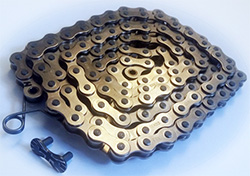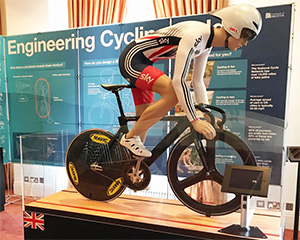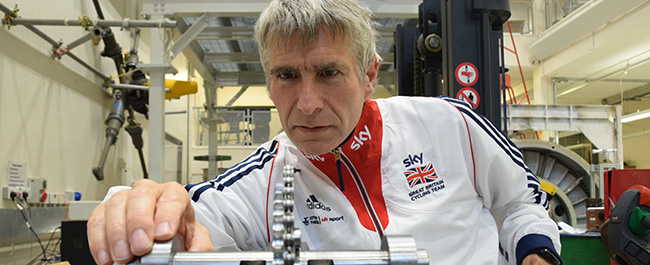Innovative chain technology saves energy, improves performance and wins cycling gold medals
Work within the Faculty of Engineering at the University of Bristol has helped to develop innovations in drive chain technology that have achieved a 50% energy saving in industrial settings and delivered improvements in power transmission that have been adopted by the Team GB Olympic Cycling Team.
Ever since roller or bush chains were first invented by Hans Renold in Manchester in 1880 they have been used to drive everything from industrial equipment to cars and bicycles. Over a century later, new research at the University of Bristol funded by Renold plc and British Cycling has helped to develop improvements in chain design and testing methods that have taken chain performance to a new level.
Breakthrough in testing and modelling
The breakthrough from the research came with the invention of innovative new chain testing rigs, such as pendulum rigs, that overcame longstanding issues with testing accuracy and enabled a leap forward in the collection of data on chain performance. The pendulum rigs have been exhibited at the Royal Society and are now being adopted by other chain drive research centres around the world.
The team also applied mathematical modelling based on data from the new rigs to gain critical new insights into the relationship between geometry and power transmission efficiency. The advanced testing technology has also supported the development of new improvements in material coatings and lubrication – for example, a specially treated pin and bush to improve efficiency and reduce wear.
Reduction in industrial energy consumption
Put together these innovations have reduced the power loss in chain drives by around 50% and improved transmission efficiency from around 96% to 98% - making for a 2% improvement in the production of gross power alongside improvements in energy consumption and wear life and associated maintenance costs.

The benefit is being felt around the world with positive impacts for the environment. As a result of the research, Renold has been able to create efficient versions of the 0.5-inch and 0.375-inch pitch roller chains. These chain sizes are supplied to customers in over 90 different countries in industries like food, manufacturing and transport – all of which have an agenda to reduce their energy consumption and impact on climate change.
Renold-Jeffrey, a US-based subsidiary of Renold, has also commissioned a new industrial test rig based on the pendulum test rig developed at Bristol. The firm says this will make it commercially feasible to test large industrial chains with loads up to 9 tonnes for the first time and enable further substantial savings in energy consumption.
Going for gold

The work by the team at Bristol has also had a big impression in the world of sport. At the 2016 Rio Olympics, Team GB Cycling Team adopted the new Renold 1/2 inch pitch chain developed as a result of research at Bristol alongside much larger chain wheels (also designed by the University) that had never been used before in elite cycling. Team GB cycling won a record of six golds, four silver and one bronze medal and broke two world records.
The winning streak continued at the Tokyo Olympics in 2021 when Renold introduced a new 3/8 inch pitch chain based on learnings from Rio. Team GB topped the cycling medals table with another stellar performance.
As the head of Technology at British Cycling said in a press release: “We knew when we were on the starting gates we had the best chain in the world.”
 Work with us
Work with us
Our Industrial Liaison Office helps you to develop research partnerships.
Quick facts
- Power loss in chains reduced by 50%
- Transmission efficiency increased from 96% to 98%
- Significant benefits for energy consumption and performance
